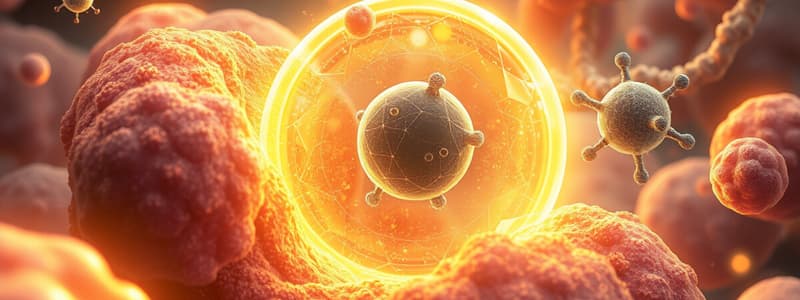Podcast
Questions and Answers
What is the primary role of carbohydrates in living cells?
What is the primary role of carbohydrates in living cells?
- Structural component of cell membranes
- Facilitating cell division
- Storage of genetic information
- Source of energy (correct)
Which statement accurately describes carbohydrates?
Which statement accurately describes carbohydrates?
- They are an essential component of living cells. (correct)
- They are only found in animal cells.
- They are unnecessary for cell function.
- They are considered secondary sources of energy.
Which of the following best defines carbohydrates?
Which of the following best defines carbohydrates?
- Fats used for cellular structure
- Proteins that store energy
- Nutrients primarily found in vitamins
- Essential molecules that provide energy (correct)
In terms of energy provision, how do carbohydrates function in living organisms?
In terms of energy provision, how do carbohydrates function in living organisms?
What would happen to an organism without carbohydrates?
What would happen to an organism without carbohydrates?
Study Notes
Carbohydrates in Living Cells
- Carbohydrates serve as the primary source of energy for cells, providing fuel for cellular processes.
- They play a critical role in the structure of cell walls in plants and some species of bacteria, contributing to overall cellular integrity.
- Carbohydrates are essential for cell recognition processes, acting as signaling molecules on cell surfaces.
Definition and Characterization
- Carbohydrates are organic compounds comprised of carbon, hydrogen, and oxygen, typically in a 1:2:1 ratio.
- They can be classified into three main categories: monosaccharides (simple sugars), disaccharides (two sugar molecules), and polysaccharides (long chains of sugar molecules).
- An accurate description of carbohydrates highlights their role in energy storage, structural components, and cellular communication.
Energy Provision
- Carbohydrates provide immediate energy through glycolysis, breaking down glucose to release ATP (adenosine triphosphate).
- They are stored as glycogen in animals and starch in plants, serving as energy reserves that can be mobilized when needed.
- The anaerobic metabolism of carbohydrates can yield energy without requiring oxygen, beneficial during intense physical activity.
Implications of Absence
- Without carbohydrates, organisms would struggle to obtain quick energy, affecting overall metabolism and energy levels.
- Prolonged carbohydrate deprivation can lead to muscle breakdown, as the body starts to utilize protein and fat as alternative energy sources.
- Lack of carbohydrates can impair cognitive function, as glucose is the brain's primary energy source.
Studying That Suits You
Use AI to generate personalized quizzes and flashcards to suit your learning preferences.
Description
This quiz explores the essential role of carbohydrates in living organisms, including their functions, definitions, and energy provision. It also examines the consequences of carbohydrate deficiency. Test your understanding of this vital biomolecule.




